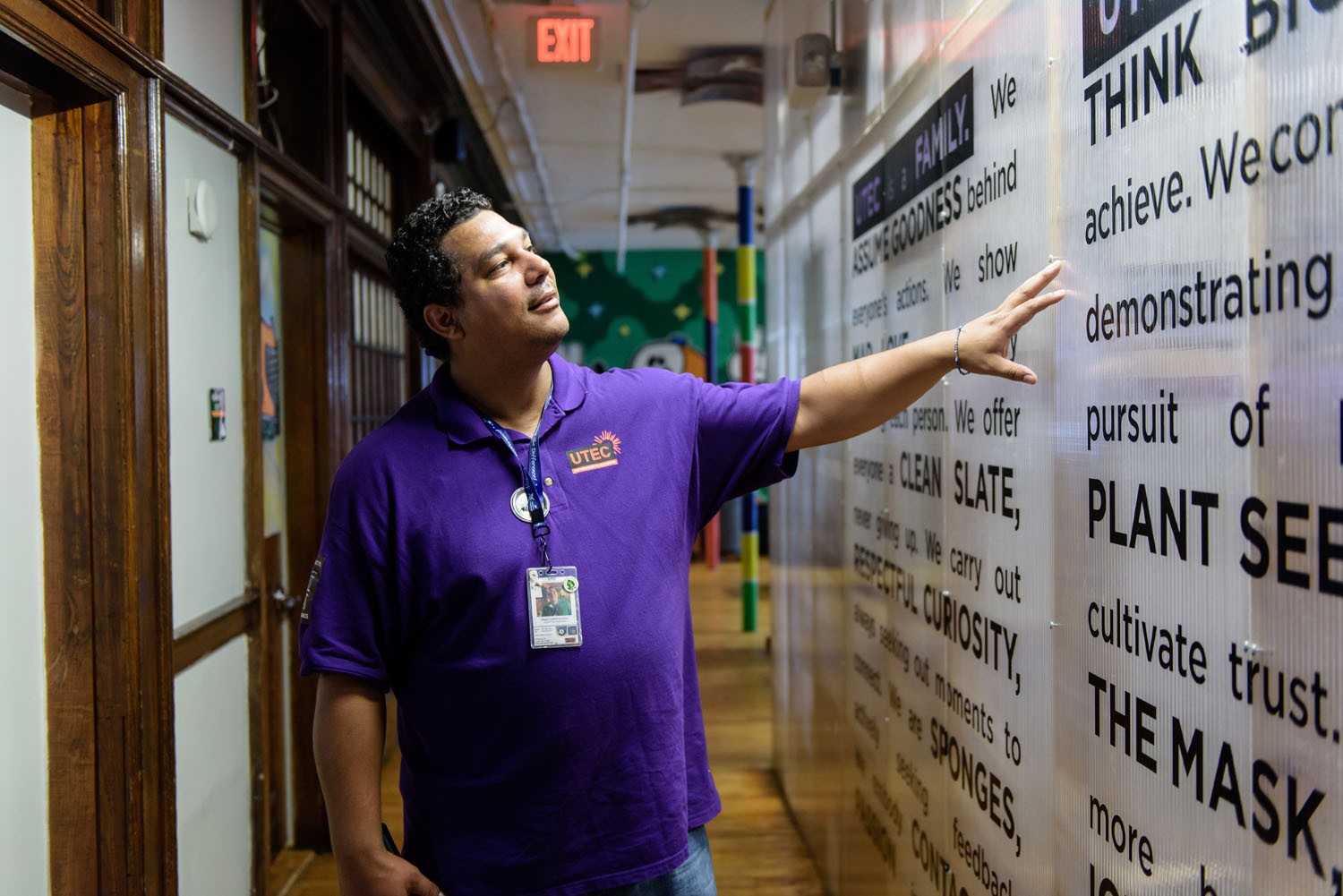At UTEC, we work to help disconnected young people in the communities of Lawrence and Lowell, MA trade violence and poverty for social and economic success. In our work, we believe that the young people we serve are experts in their own experience. This belief is shared by most high-performing direct service agencies — and the five foundations profiled in the CEP report, Staying Connected. In reading CEP’s report, it was affirming to learn that these funders reflect some of the same core values that inform UTEC’s approach to learning from the experts we serve. UTEC’s young people have histories of incarceration or serious gang involvement — problems that many private funders aim to address — and listening to their experiences and needs is the only way we can know how we can best serve them.
UTEC’s field, youthwork, only happens within the framework of positive relationships — much like in effective grantmaking. UTEC is committed to achieving outcomes in a way that is consistent with a set of values that serve and honor our young adults. Our values do not exist only on paper or on a page of our website. These values are prominently displayed in the main entry hall of our program center, serving as a constant reminder to all who walk in, and our staff and young people discuss these values in day-to-day life. They represent the key ingredients to the organization’s culture, and even our staff performance reviews incorporate them. We take pride in these values and the role they play in our work, and we were gratified to find that many of them align directly with ideas that come through in Staying Connected.

Assume Goodness: Each of the foundations in the report emphasize high expectations for grantee organizations — and a high estimation of the expertise of their leaders. “We make sure we take advantage of the information that they are sharing,” says Helios Education Foundation President and CEO Paul Luna in the report. Funders that recognize the value that an agency brings are also best positioned to push that agency out of its comfort zone and into its learning zone — just as youthworkers who truly understand a young person’s needs can help them lean into their challenges.
See Beyond the Mask: In youthwork, it’s essential to go beyond the information that a participant first presents. The same is true for program officers. “You have to understand what is really happening, otherwise you are imposing an irrelevant solution,” says Linda Thompson, senior vice president, program administration and organizational learning at Helios. The Harry and Jeannette Weinberg Foundation notes its intensive due diligence process, and nonprofits must be willing to share both successes and challenges in order to take full advantage of a program officer’s knowledge.
Respectful Curiosity: It’s no coincidence that each of these highly rated funders spends a lot of time face-to-face with grantees and their beneficiaries. “We take a lot of their time, but we do not waste it,” Thompson says. UTEC site visits engage our young adults and staff at all levels to best reflect our program work — and, even more significantly, our organizational culture. Even a strong proposal cannot capture the positivity and personal connections that are essential to our work.
Contagious Passion: Several of the foundations in the report highlight the importance of connecting grantees to one another, whether through formal learning networks or individual introductions, to learn more about best serving the populations we seek to help. We’ve found this extremely beneficial in our own experience. For example, UTEC’s partnership with the Edna McConnell Clark Foundation’s PropelNext cohort is among our best case scenarios of the network approach. The foundation’s experienced team guided UTEC through best practices for evaluation and data collection, and the grantee cohort tested, questioned, and applauded each organization’s evolving metrics for success. Far beyond the original grant period, UTEC and other PropelNext agencies have shared performance measurement practices, sent staff on “exchange visits,” and served as individual and organizational sounding boards for one another. Additionally, as a member of the Kresge Foundation’s new NextGen human services cohort, we see a similar network evolving among that group as well.
Chip Away: With a higher-level view of a field comes a longer list of opportunities for improvement. Foundations recognize that change takes sustained strategy as well as resources. In Staying Connected, the Nord Family Foundation specifically notes the way that philanthropy can improve the impact of public dollars, especially by investing in data capacity. “It’s imperative for the philanthropic community to be a voice,” says John Mullaney, the foundation’s executive director.
Fund for Shared Insight, which provided funding for CEP’s report, also supported UTEC’s own constituent research through a Listen for Good grant. Notably, our study revealed that young adults specifically cited many of the values mentioned above in their feedback about UTEC’s program model. When asked what UTEC does well, participants cited “positive vibes/attitude” in the UTEC environment. Most respondents thought that UTEC’s positive vibe setting was a strength of the program. They also thought that UTEC was doing well preparing young adults for work and getting them off the streets. Some participants also mentioned that UTEC was good at showing love and support, and that UTEC is loyal and persistent.
UTEC’s institutional funding is roughly equal between public dollars and private funders. We appreciate that many of our state and federal grant program officers are also investing time in the best practices mentioned by the foundations in Staying Connected.
For example, this summer, a Department of Justice program officer spent nearly an hour in a wide-ranging conversation with two of our young adults, Abdiel and Tania. In their conversation, Abdiel and Tania shared their experiences in school, with the justice system, and in UTEC’s workforce development and education programming. The DOJ program officer also met with numerous program staff during her multi-day visit, and she asked each to introduce themselves with their role at UTEC and their personal story of how they came to this work. “I’m here to learn everything I can for the field, not just about what you’re doing with this grant,” she told us repeatedly.
Funders and nonprofits all agree that shared values between the funder and the funded are essential to successful social sector work. Examples like our visit from that DOJ program officer and the stories told by the five foundations in Staying Connected highlight how deep, values-driven engagement with the individuals we are seeking to help can improve both funding strategies and program design. ![]()
Gregg Croteau, MSW, is executive director of UTEC, a community-based nonprofit in Lowell, Massachusetts that serves young adults with histories of incarceration or serious gang involvement. Follow Gregg on Twitter at @gcroteau.



